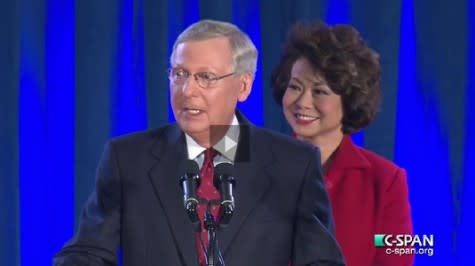The other nuclear debate in Washington this week
On Tuesday morning, Israeli Prime Minister Benjamin Netanyahu will be speaking about the Iranian nuclear threat to Congress, but many legislators at the speech will have another “nuclear” topic on their mind.
The Department of Homeland Security funding impasse has led some Republican leaders to speak about another “nuclear option” debate for the Senate, in regards to filibusters.
The frustration within the Republican caucus is the continuing resistance by Democrats to a DHS funding bill that would block money used to implement President Obama’s immigration plans.
In November 2013, then Majority Leader Harry Reid used a series of parliamentary tactics to change the number of votes needed to move motions onto the Senate floor for most presidential nominations, from 60 votes to 51 votes. Called the “nuclear option,” Reid’s move ignited a powder keg of partisan rhetoric, and it effectively blocked the Republicans from opposing most Obama administration nominees until this January.
However, the 60-vote filibuster requirement remained to allow debates and votes for legislative acts, and for Supreme Court nominations.
On Sunday, House Majority Leader Kevin McCarthy, a Republican from California, told NBC News that the new GOP leaders in the Senate should take a page from Reid’s books, and eliminate the filibuster for votes about legislative actions.
“I don’t think going nuclear when you have 57 percent of the Senate voted for the Collins amendment [on DHS funding] that would take away the president’s action,” McCarthy said. “That’s not nuclear, when 57 percent of the American representation says it’s wrong. That’s not in the Constitution. … I think they should change the rules.”
Senate Majority Leader Mitch McConnell, who bitterly opposed Reid’s filibuster ban on nominations, faces an uncertain situation as a one-week DHS funding measure ends this weekend, and the Democrats plan to maintain their filibuster tactics on a long-term DHS funding measure that blocks immigration policy changes.
So far, McConnell and other GOP Senate leaders don’t want to conference with the House on a compromise bill. Instead, another proposal is expected by mid-week and another last-second vote is possible on Friday, as the DHS tries to avoid a shutdown.
There seems to be little public talk from Senate leaders about “Nuclear Option II.”
Reid’s move in 2013 was the biggest Senate rule change since 1975, when the cloture vote threshold was lowered from two-thirds of the Senate.
The filibuster’s roots go back to 1805, when the Senate acted on a recommendation from Aaron Burr to eliminate a rule that automatically cut off floor debate.
Recent Stories on Constitution Daily
Constitution Check: Did the House act illegally in inviting Netanyahu?
Should President Obama, or any President, be allowed to serve a third term?
Preview: Obamacare’s big Supreme Court test on Wednesday
If Abraham Lincoln had died 1861, who would have replaced him?


